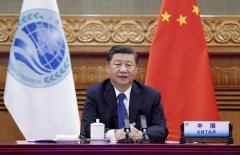Home>>
Westerners need to adapt to China’s influence(Global Times) 14:49, May 16, 2021

Kerry Brown Photo: Courtesy of Kerry Brown
Editor's Note:
The West and China "need to have a forum for learning, that is a two-way process." Kerry Brown, director of the Lau Institute at King's College London, believes that there are many lessons from China that the world can draw on. Why does Brown hold such an observation? What are some ways Western countries can view their relations with a peacefully rising China? Why do dialogues between Western countries and China always seem difficult? Brown shared his opinions on these issues with Global Times (GT) reporter Sun Wei.
GT: How many years have you been studying China? How many researchers does the Lau China Institute at King's College, London currently have? Could you talk about your recent research topics or your upcoming book?
Brown: I first visited China in 1991, 30 years ago. I started studying Mandarin [Putonghua] in Melbourne, Australia in 1992, and then undertook a postgraduate degree in it in 1993. The Lau Institute has currently six full-time academic staff. These are people the institute directly funds. Most other similar institutes have affiliates. So we are pretty unique. We also have 30 doctoral students, and usually about 40 masters students each year. Currently, I am working on an annotated selection of the key works of major European thinkers on China since the time of Marco Polo to the 1970s - people like Voltaire, Montesquieu, Leibniz, Marx, Hegel, Weber, Russell, Kristeva and Barthes. This will be published later this year.
GT: British Prime Minister Boris Johnson recently said he wants more business deals with China, and warned that a cold war with China would be a "mistake." PM's father Stanley urged him to "stand up" to Tory hawks, saying post-Brexit UK must work "even closer" with China. What's the public view in general? Do they oppose or worry about the so-called new cold war?
Brown: British public opinion to China historically has never been either that warm or that hostile. Until COVID-19 most people probably didn't think much about China and any role it might play in their lives. Of course, with the pandemic, and the arguments over virus spread, management, and so on, China has become of more interest to politicians, commentators, and a wide range of different people. It is good there is wider interest in China, but not so good that it is often people with the most extreme views and the loudest impression of being certain despite having little to go on in terms of real experience have found a platform. I sometimes feel nostalgic for the time when China was a less hot topic in the UK!
GT: China had had golden relationship with the UK, Germany, France and so on, but there has been a lot of turbulence in recent years. Why there are so many back and forth moves? What is the reason that the dialogue between Western countries and China always seems difficult?
Brown: This is why I decided to gather the ideas of key thinkers from European history like Leibniz and Voltaire, Hegel and Marx on China. In many ways they are symptomatic of the kinds of structural issues we still see today. Broadly, the Leibniz school is seeking a sort of objectivity - to try to set aside our own convictions and proclivities and see China "scientifically." For Voltaire, there was an attitude verging on worship of a China he knew only remotely and idealized. This was more about his own disillusionment with the politics of 18th-century Europe. For Montesquieu, China was negative - despotic and backward. In many ways, that same division still exists in Europe today. Social media with its deadly ability to decontextualize things and remove nuance hasn't helped. I really wonder how things would be if we had all the same issues between China and Europe as we do now, but no social media in Chinese or English (or other European languages). Surely things would have been better in some respects, at least in terms of the quality of our respective discourse towards each other.
GT: In a recent dialogue with the Beijing-based Center for China and Globalization, you said, the US and Europe "were going to China to teach to show how you do things. I think that we need to kind of have some recognition that there are many things where China can come to the rest of the world and teach and show how you can do." Why did you have such an observation, and what kinds of governance experience can the US and Europe use for reference?
Brown: Clearly there are things that China has achieved in terms of developing improved livelihood for a large number of its citizens, and building infrastructure, that it can [teach], and has been teaching to other countries. My point was that the European habit of always wanting to be the explainer and teacher (and I acknowledge, I am as prone to this as anyone else!) needs to change now. Yes, there are many areas where Europe is still strong in terms of knowledge production. But there are an increasing number of areas where China can teach Europe things - environmental science is one. We need to be open to this.
GT: European countries have recently been caught up with the third wave of the coronavirus. How would you compare China's anti-epidemic measures with those of Europe and the US?








